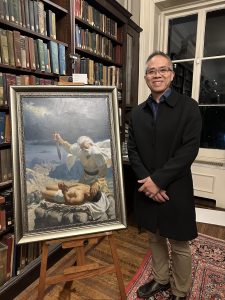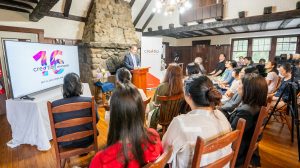The use of arts will greatly impact the work of evangelism and discipleship, said an Arlington, Texas, professor.
Stan Moore noted that a large majority of students in many of his seminary classes came to faith through music.
This is because “the arts speak to the whole person – intellectually, emotionally, physically and of course spiritually reaching into the very depths of our minds and bodies and spirits,” he said.
Professor Moore was speaking at the Global Consultation on Music and Missions event in Singapore. He co-founded the consultation and also currently serves as senior fellow and professor of Church Music and Worship at the B. H. Carroll Theological Institute.
The event draws music missionaries worldwide to learn from one another. The arts, he said, is as an “indispensable means to reach those who do not know Christ and to teach and disciple those who do know Him.”
Christian artists have a responsibility to “create or adapt artistic expressions that adequately and embody the Christian message within a given culture,” he highlighted. Already Christians are called to “use all possible and worthy means to communicate the Gospel of Jesus Christ to all peoples,” Moore noted. This includes every talent, gift and ability Christians have.
If Christians are called to use any tool they can find to spread the Gospel, there is clearly no justification for passing on a powerful one, he reasoned. However, the Texas professor cautioned music missionaries against confusing or distorting truth through their art, language and lifestyle.
The affective qualities of the artistic expression should appropriately reinforce the truth of the message, he emphasized. It should not have any inappropriate or unwholesome associations for a given culture.
Moore held up God as the supreme communicator. Jesus Christ became a human being to clearly communicate His love for people in a way they could understand. He did this in order that they might know Him, understand Him and be brought back into a right relationship with God. “Jesus became a man; a specific man at a given time and place with a specific message to communicate to a lost world,” he told attendees at Singapore Bible College and Bartley Christian Church.
He did not force others to learn His language, Moore added. He learned theirs. Jesus used art forms His listeners could understand. He told parables, stories and drew pictures. Mere transmission of information should not be mistaken for communication, he clarified. Real communication is characterized by involvement and “exchange of creative understanding” between two or more parties, he explained. In order for communication to take place, the communicator must move into the frame of reference of the receptors. This is the responsibility of any communicator, according to Moore.
As important as the arts is, it is still merely a means, he emphasized. The arts is a means to call and disciple all peoples to be true worshippers of God. The message that Christians are called to spread is “not just about (Christ’s) atonement. The full message of Christ was His very life; His life of obedience to the Father, His obedience to death and His glorious resurrection from the dead,” he said. The message of Christ is not a simply a truth to be displayed through art. It is a message that must be lived out, Moore stressed.
This is the first time the Global Consultation on Music and Missions is being held outside the U.S. since it began in 2003. Other keynote speakers at the July 4-7 event include Landa Cope, Ron Man and Tony Yeo.
Cope is the founding international dean of the College of Communication for Youth With A Mission’s University of the Nations. Man serves as director of the department of worship and creative arts for Greater Europe Mission. And Yeo is deputy senior pastor of Covenant Evangelical Free Church.

